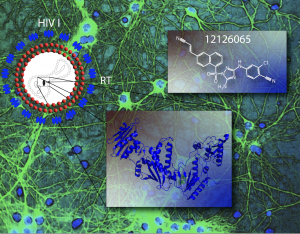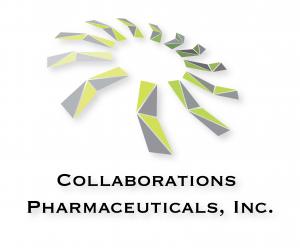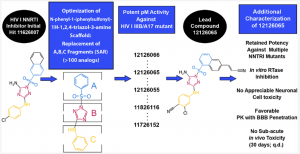Collaborations Pharmaceuticals Announces Publication of New HIV Reverse Transcriptase inhibitors to address HAND
A new paper describes a novel class of non-nucleoside reverse transcriptase inhibitors for HIV associated neurocognitive disorders (HAND)
RALEIGH, NC, USA, May 2, 2023/EINPresswire.com/ -- Collaborations Pharmaceuticals, Inc. (CPI) with collaborators at the Research Center of Biotechnology RAS, Moscow (Dr. Vadim Makarov); the University of North Carolina, Chapel Hill (Dr. Julie Nelson); as well as collaborators at the University of Cagliari are pleased to announce their NIH/NINDS funded work resulting in new peer reviewed publication entitled "N-phenyl-1-(phenylsulfonyl)-1H-1,2,4-triazol-3-amine as a new class of Human immunodeficiency virus (HIV) non-nucleoside reverse transcriptase inhibitors (NNRTI)."HIV infection is one of the most important pathogens affecting mankind. There were approximately 1.5 million new cases in 2021 and 38.4 million living with HIV, amongst them 2.73 million were children. The disease can be managed with a cocktail of antiretroviral drugs including NNRTI. It has been reported that there is resistance against NNRTIs as well as side effects such as HIV associated neurocognitive disorders (HAND), which results in symptoms from minor problems with memory to severe dementia-like symptoms. We therefore need to have more diversity in the types of chemical structures assessed, in order to stand the best chance of addressing both drug resistance and HAND in future.
“We have identified the N-phenyl-1-(phenylsulfonyl)-1H-1,2,4-triazol-3-amine scaffold as possessing potent activity as an NNRTI. In the process we have developed over 100 analogs using a classical medicinal chemistry structure activity relationship (SAR) to optimize activity against wild-type, A17 mutant (K103N/Y181C) as well as other common mutant strains resistant to approved NNRTIs. This has led to the discovery of a series of optimized compounds with picomolar activity against wild-type HIV that retain activity against these clinically relevant mutants” said CPI CEO Dr. Sean Ekins.
“HIV remains a global threat and as such the need for additional treatments remains of utmost importance. Current therapies have yet to eradicate the prevalence of HAND; therefore, this still represents an important therapeutic goal that we have addressed. These molecules are a new class of HIV NNRTI and without likely toxicity seen with older drugs. We also look forward to partnering these molecules from our pipeline with other companies to further develop this molecule.”
Publication information:
N-phenyl-1-(phenylsulfonyl)-1H-1,2,4-triazol-3-amine as a new class of HIV-1 non-nucleoside reverse transcriptase inhibitor
Thomas Lane1#, Vadim Makarov2#*, Julie A. E. Nelson3#, Rick B. Meeker4, Giuseppina Sanna5, Olga Riabova2, Elena Kazakova2, Natalia Monakhova2, Andrey Tsedilin2, Fabio Urbina1, Thane Jones1, Ashley Suchy3 and Sean Ekins1*
1Collaborations Pharmaceuticals Inc., 840 Main Campus Drive, Lab, 3510, Raleigh, NC 27606, USA.; 2Research Center of Biotechnology RAS, Leninsky Prospekt 33-2, 119071, Moscow 119071, Russia; 3Department of Microbiology and Immunology, University of North Carolina, Chapel Hill, NC 27514, USA.; 4Department of Neurology, University of North Carolina, NC 27514, USA; 5Department of Biomedical Science, University of Cagliari, Monserrato, 09042, Italy.
# co-first authors
Funding
Research reported in this publication was supported by the National Institute of Neurological Disorders and Stroke of the National Institutes of Health under Award Number 1R01NS102164-01. The content is solely the responsibility of the authors and does not necessarily represent the official views of the National Institutes of Health.
We also kindly acknowledge NIH funding: R44GM122196-02A1 from NIGMS and 1R43ES031038-01 from NIEHS (PI – Sean Ekins). “Research reported in this publication was supported by the National Institute of Environmental Health Sciences of the National Institutes of Health under Award Number R43ES031038. The content is solely the responsibility of the authors and does not necessarily represent the official views of the National Institutes of Health.” This work was supported by the University of North Carolina at Chapel Hill Center for AIDS Research (P30 AI050410).
Sean Ekins
Collaborations Pharmaceuticals, Inc.
+1 215-687-1320
email us here
Visit us on social media:
Twitter
LinkedIn
YouTube
Legal Disclaimer:
EIN Presswire provides this news content "as is" without warranty of any kind. We do not accept any responsibility or liability for the accuracy, content, images, videos, licenses, completeness, legality, or reliability of the information contained in this article. If you have any complaints or copyright issues related to this article, kindly contact the author above.



